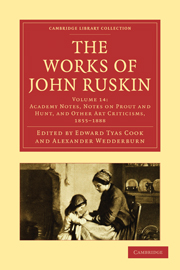Book contents
- Frontmatter
- Contents
- LIST OF ILLUSTRATIONS
- INTRODUCTION TO THIS VOLUME
- PART I “ACADEMY NOTES” (1855–1859, 1875)
- LIST OF ARTISTS AND WORKS MENTIONED IN “ACADEMY NOTES”
- PART II LETTERS AND PAPERS ON PICTURES AND ARTISTS (1858–1887)
- 1 PRE-RAPHAELITISM IN LIVERPOOL (1858)
- 2 GENERALIZATION AND THE SCOTCH PRE-RAPHAELITES (1858)
- 3 JOHN LEECH'S OUTLINES (1872)
- 4 ERNEST GEORGE'S ETCHINGS (1873)
- 5 THE FREDERICK WALKER EXHIBITION (1876)
- 6 ARTHUR BURGESS (1887)
- 7 THE BLACK ARTS. A REVERIE IN THE STRAND (1887)
- PART III NOTES ON SAMUEL PROUT AND WILLIAM HUNT (1879–1880)
- APPENDIX
- Plate section
3 - JOHN LEECH'S OUTLINES (1872)
Published online by Cambridge University Press: 05 February 2015
- Frontmatter
- Contents
- LIST OF ILLUSTRATIONS
- INTRODUCTION TO THIS VOLUME
- PART I “ACADEMY NOTES” (1855–1859, 1875)
- LIST OF ARTISTS AND WORKS MENTIONED IN “ACADEMY NOTES”
- PART II LETTERS AND PAPERS ON PICTURES AND ARTISTS (1858–1887)
- 1 PRE-RAPHAELITISM IN LIVERPOOL (1858)
- 2 GENERALIZATION AND THE SCOTCH PRE-RAPHAELITES (1858)
- 3 JOHN LEECH'S OUTLINES (1872)
- 4 ERNEST GEORGE'S ETCHINGS (1873)
- 5 THE FREDERICK WALKER EXHIBITION (1876)
- 6 ARTHUR BURGESS (1887)
- 7 THE BLACK ARTS. A REVERIE IN THE STRAND (1887)
- PART III NOTES ON SAMUEL PROUT AND WILLIAM HUNT (1879–1880)
- APPENDIX
- Plate section
Summary
I am honoured by the request of the sister of John Leech that I should give some account of the drawings of her brother, which remain in her possession; and I am able to fulfil her request without departing from the rule which has always bound me, not to allow any private interest to weigh with me in speaking of matters which concern the public. It is merely and simply a matter of public concern that the value of these drawings should be known and measures taken for their acquisition, or, at least, for obtaining a characteristic selection from them, as a National property. It cannot be necessary for me, or for any one now to praise the work of John Leech. Admittedly it contains the finest definition and natural history of the classes of our society, the kindest and subtlest analysis of its foibles, the tenderest flattery of its pretty and well-bred ways, with which the modesty of subservient genius ever amused or immortalized careless masters. But it is not generally known how much more valuable, as art, the first sketches for the woodcuts were than the finished drawings, even before those drawings sustained any loss in engraving.
John Leech was an absolute master of the elements of character—but not by any means of those of chiaroscuro,—and the admirableness of his work diminished as it became elaborate. The first few lines in which he sets down his purpose are invariably of all drawing that I know the most wonderful in their accurate felicity and prosperous haste. It is true that the best possible drawing, whether slight or elaborate, is never hurried.
- Type
- Chapter
- Information
- The Works of John Ruskin , pp. 332 - 334Publisher: Cambridge University PressPrint publication year: 2010First published in: 1904



